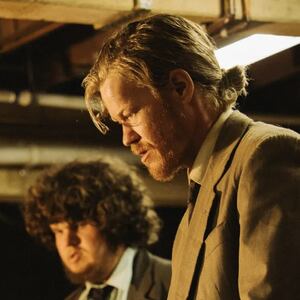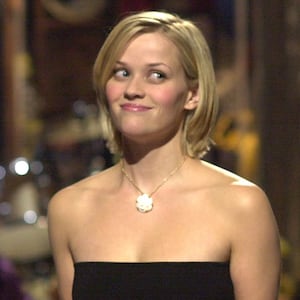From her breakthrough role in Winter’s Bone to her Oscar-winning work in Silver Linings Playbook and her harried turn in mother!, Jennifer Lawrence has married glamorous charm and beauty with rough-around-the-edges toughness and explosive volatility, and she once again demonstrates that intense combination of magnetism and madness in Die My Love.
An adaptation of Argentine author Ariana Harwicz’s 2012 novel of the same name, Scottish auteur Lynn Ramsay’s film is a psychological head-trip powered by its riveting lead as a wife and mother coming apart at the seams due to postpartum depression and, also, her primal and destructive impulses. With an uninhibited fieriness that’s rooted in profound need and longing, Lawrence—opposite a beleaguered Robert Pattinson—delivers one the finest performances of her career, energizing the writer/director’s portrait of feminine rage, sorrow, and mania.
Die My Love, which hits theaters Nov. 7, opens with a prolonged static shot of Grace (Lawrence) and Jackson (Pattinson) arriving at, and strolling through, the abandoned home of Jackson’s dead uncle, whose floors are covered in leaves, and which they plan to make their own.
Such initial tranquility gives way to sensual hysteria as Ramsay cuts to the couple having vigorous mosh pit-style sex, all slapping, thrashing, and biting, and that rowdy energy continues when, following another quick edit, they’re seen dancing in their now-furnished kitchen, Grace’s pregnant belly about to pop. An instant later, Grace is crawling like a predator around the tall grass field surrounding their abode, stalking Jackson and their baby son as the two cavort on the porch. Alone, she drops to her back and, as she absentmindedly stabs the ground with a kitchen knife, pleasures herself.

Grace, it’s clear, is an animal of a woman, possessed by urges that can’t be satiated—and aren’t, as Jackson, now a father, swiftly proves less interested in her snarling, growling come-ons than his bottles of Budweiser. Gazing through a telescope, Jackson speaks of their alternate-universe selves. “Do we f---?” she asks, and though he replies, “Like rabbits,” she leaves him to his stargazing, bored by fantasies that don’t align with her present reality.
Before long, Grace is hearing a whinnying horse outside her house, and on several occasions, she spies a helmeted motorcyclist noisily zoom past her front yard—two muscular, wild, dangerous figures who feel like manifestations of her libidinous hunger. At home with her child or, in a pre-birth flashback, visiting with Jackson’s mother Pam (Sissy Spacek) and father Harry (Nick Nolte), her gaze is distant and despondent, as if she were retreating into herself—and growing disgusted with the domestic life about to swallow her whole.
Lawrence’s Grace adores her child but little else, snapping at a convenience store clerk for making friendly chitchat and flipping off (and shooting with her finger gun) Jackson as he lies in bed, passed out from another night of drinking. When her husband calls from a diner while on the road and she hears a waitress’ voice in the background, thoughts of infidelity flash across her mind, and she reacts with suspicion when, later, she finds a package of condoms in Jackson’s truck.
During the ensuing squabble, Grace blows up one of the prophylactics like a balloon, distracting her spouse and causing him to crash into the aforementioned black steed. Further fraying her nerves, Jackson brings home a puppy and then promptly leaves him in her care—a burdensome situation made intolerable by the dog’s shrill, non-stop barking.

A writer who can no longer write, Grace is coming undone in Die My Love, and just as she attuned You Were Never Really Here to Joaquin Phoenix’s fury and anguish, Ramsay plugs directly into Lawrence’s mounting discontent and self-destructive passion.
At night, Grace absconds to a barn where she meets the motorcyclist, Karl (LaKeith Stanfield), whose lip she erotically cuts with a blade, and she eventually sneaks over to her mother-in-law’s house to surreptitiously steal the shotgun to which she clings. Beset by bouts of sleepwalking in the wake of her husband’s death, Pam is a kindred maternal soul in disarray. She’s also the sole source of comfort in Grace’s life, which is otherwise marked by increasing tensions with her husband, whom Pattinson embodies as a sloppy and inattentive partner who’s understandably exasperated by his wife’s feral antagonisms. With shaggy hair and a sloppy demeanor, he’s the cartoonishly flummoxed and frustrated foil to Lawrence’s turbulent woman on fire.
Die My Love sizzles with Lawrence’s live-wire hostility, beneath which lies a wellspring of turmoil, alienation, and despair. As befitting Grace’s savage heart and soul, the actress is often naked, yet regardless of how much she’s clothed, she radiates fierce, uncontrollable carnality—as established, most humorously, by her decision at a house party to strip down to her underwear and leap into a pool of children.
Pam attempts to reassure Grace by telling her that all new mothers go a bit crazy. However, things soon transition from combative to downright unhinged, complete with Grace committing shocking acts of violence against others and herself, as when she scratches at a bathroom’s walls until her fingers bleed. More troubling still, a flashback to the pair’s wedding complicates the notion that Grace is merely struggling to cope with motherhood, revealing that her stormy, insatiable appetites are less a novel development than an inherent condition.

Avoiding pat psychoanalysis, Ramsay and Lawrence imagine Grace as an untamable force of nature torn between competing thoughts, instincts, and desires, and the film picks up runaway speed in its final passages, during which the past and the present merge into a single, traumatic timeline.
No matter how its events are literally tethered, Lawrence keeps the material whole, exuding a feverish distress that’s breathtaking in its vigor. That she manages to elicit empathy for Grace’s plight while often rendering her over-the-top behavior funny is a testament to the star’s assured grasp of Grace’s deteriorating headspace, and Ramsay—shooting in a 4:3 aspect ratio and embellishing the proceedings with piercing expressionistic flourishes—potently visualizes the character’s detachment, claustrophobia, and dejection.
Together, the actress and director craft a slow-burn vision of grief and suffering that leaves one dazed, confused, and electrified.









